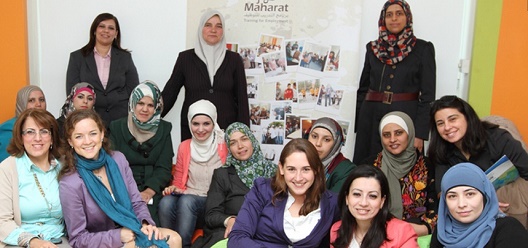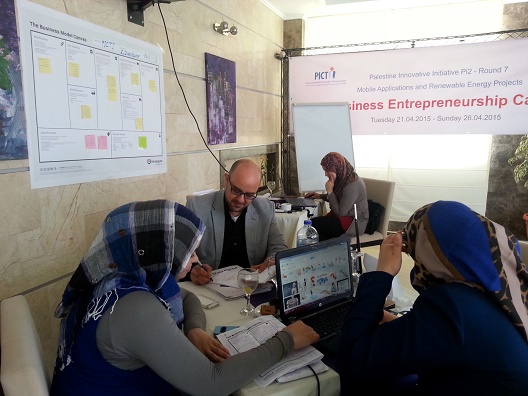There has been a lot of hype recently surrounding startups from Palestine, but they aren’t working in a vacuum. There’s a thriving ecosystem of incubators and accelerators that are supporting startups.
Ramallah-based hotel booking platform Yamsafer closed its latest $3.5 million Series B round not long ago, and bringing Palestine’s startup scene to international attention.
The West Bank and Gaza have, between them, a surprising number of business incubation programs and startup accelerators, and Wamda is shining a light on the main eight listed below alphabetically.
1. Arabreneur (West Bank)

Dr AlJaber Receiving Best Angel Investor in MENA 2014 from EBAN. (Image via Arabreneur)
Arabreneur was launched in 2013 in Ramallah to support, connect and assist investment in early stage tech businesses that have a minimum viable product and are ready to launch. Arabreneur was inspired and supported by Jordanian accelerator MenaApps, and they’re both led by Palestinian investor Abdul Malik AlJaber.
Model: A call for applications is usually announced every four months, and accepts applications from entrepreneurs and other incubators. The accelerator provides training and capacity building services for teams and offers funds starting from $100,000, along with a wide suite of services. It also provides its startups regional and international exposure through office spaces in Ramallah, MenaApps’s resources in Amman, a showroom in Dubai, a Developer Kitchenette in Canada) and another location soon in Bahrain. Arabreneur’s startups also get to pitch to its own Business Angel Network.
Featured startup: Edunation is an educational social platform that works with the Gulf and Canada. It has a user base of 80,000 and a team of 40 employees.
2. Business & Technology Incubator (Gaza)

Towards Riyada, the televised Business Plan Competition by BTI. (Image via BTI)
Gaza-based Business and Technology Incubator (BTI) was established at IUG University in 2006 to help university graduates start their own startups and small businesses. Since then, the incubator launched the first televised business plan competition in Palestine in 2014 and implemented projects in partnership with SPARK, BiD Network, QiF and UNDP. It recently started its latest business incubation project ‘Seed’ for startups with established concepts.
Model: BTI holds annual business plan competitions, each of which is open to aspiring entrepreneurs and university graduates with business ideas. After training and coaching participants, the incubator selects about 10 startups per round to receive startup funding, office spaces, logistic and business support, and investor and customer matching services.
Featured startups: Media startup Ain Media; graphic studio Magic Lens; and Kirdash, a business that employs housewives who create hand-made embroideries.
3. BWF’s Business Development Center (West Bank)

Entrepreneurs and partners of BWF. (Image via BWF)
The Business Women’s Forum (BWF) was established in 2006 to empower Palestinian women. It has a pre-incubation program in its Business Development Center (BDC) supporting women entrepreneurs in Ramallah, and remotely in Gaza, to develop their startup business ideas with support from SPARK and other partners.
Model: Women can apply to join the BDC those who make it through receive business training and coaching to refine their concepts. Once a business matures it is offered matching and legal services and is encouraged to participate in international business events and expos. Established entrepreneurs, who don’t necessarily need to have gone through the program, get a full membership in the BWF.
Featured startups:Artizana is a Palestinian embroidery business that participated in the 2014 New York Fashion Week. Fadwa Designs in Gaza, who was coached by jewellery designer Nadia Dijani.
4. Gaza Sky Geeks (Gaza)

Image caption: Abeer Al Shaer, Salam Dalloul, and Amal Al Jarousha receive an award during Gaza Challenge, a startup bootcamp run by Mercy Corps’ Gaza Sky Geeks in March 2015. Their idea, Dieti, is an app that helps people manage their weight. (Image via Magic Lens for Mercy Corps)
Gaza’s first ICT startup accelerator and co-working hub rose to fame last year when it closed the biggest crowdfunding campaign in MENA to support its operations in January, and followed that with a second inOctober. Gaza Sky Geeks (GSG) was started in 2011 by MercyCorps and Google to support startups and connect local entrepreneurs to global networks. Its runs the annual Gaza Startup Weekend, the Intalqi women’s empowerment program and the Gaza Challenge.
Model: GSG accepts entrepreneurs with business ideas who participate in one of its startup events. Accepted teams are enrolled in GSG’s incubation program and receive business coaching by local and international mentors. The accelerator then helps match those startups with investors and helps local entrepreneurs attend startup events outside Gaza.
Featured startups: Tevy is a social app for TV shows, and Wasselni is a social car-pooling app. Both received investment from PALinnO.
5. Leaders Organization - Fast Forward (West Bank)

Fast Forward Entrepreneurs lined up at Leaders’ main campus. (Image via Leaders)
Palestinian NGO Leaders Organization runs the Fast Forward acceleration program, which launched in 2013, and supports businesses working on internet and mobile technologies. The accelerator is supported by IBTIKAR fund, Welfare Association, GIZ and e-Zone, and provides a mini tech park and a place for community discussions on entrepreneurial topics.
Model: The accelerator accepts applications on a recurring basis. Entrepreneurs with solid business ideas receive an initial investment of around $20,000 and receive specialist business coaching and advice, in addition to office space and other support services. By the end of the 120-day program, startups are matched with investors. Some startups get the opportunity to travel and participate in startup events in Silicon Valley and elsewhere.
Featured startups: Pinchpoint is a gaming startup that received investment from Sadara Ventures. Other deals are in the works for music distributor Indiepush and media intelligence startup Redcrow.
6. Mobaderoon (Gaza)

Mobaderoon cohort two entrepreneurs just before finishing their incubation period in 2014. (Image via Mobaderoon)
Mobaderoon (meaning ‘entrepreneurs’ in Arabic) was one of the first business incubation programs in the Gaza strip, starting in late 2010. The program is run by IUG University and supported by AF, IDB and Welfare Association. Due to its initial success, Mobaderoon is currently running its third incubation program.
Model: Mobaderoon accepts applications from graduates and young people with business ideas, and then follows a filtering process that ends up with 20-30 teams. They receive startup funding, office space, logistics, mentorship and marketing outreach, help to register their IPs and business brands, and a spot in a local expo. The program supports startups working in areas from ICT to hardware development and agricultural products.
Featured startups: Haweya is a graphic design and production startup with a wide network of customers in the Gulf and a team of 20 employees, and Fos7a is an internal tourism platform with tens of customers.
7. Palestinian ICT Incubator - PICTI (West Bank and Gaza)

Coaching a work group within the business entrepreneurship camp held by PICTI in 2015. (Image via PICTI)
While initially created as a tech incubator, PICTI has moved towards acceleration and commercialization through the establishment of its new Business and Innovation Center in 2012. PICTI has strong ties with the Palestinian IT Association (PITA) and has implemented business competitions with support from Intel, PalTel Group, Oxfam and Danida.
Model: With two centers in Ramallah and Gaza, PICTI accepts applications from across Palestine. Initial applicants go through multiple stages of training and assessment until a handful are selected for incubation. They receive financial and legal support in addition to training services through PICTI’s network of mentors. A select few get involved in the ‘Innovation Initiative’ acceleration program and are supported when they reach out to investors.
Featured Startups: Shu Biddak (meaning ‘what do you want’ in Arabic) is an online portal for buying and selling goods and services in Palestine. The site is ranked 14th Palestine according to Alexa.
8. UCAS Technology Incubator (Gaza)

Winners Award ceremony at UCAS Technology Incubator within the
economic recovery project. (Image via
UCAS)
The technology incubator was launched to nurture students’ business aspirations and incubate small startups within the University College for Applied Sciences (UCAS), and is supported by Oxfam, KF and IDB.
Model: The incubator accepts ideas from potential entrepreneurs and university students and offers training, seed funding and logistic support. UCAS has recently started a project to construct the Kuwait Center for Development and Technology Incubator, which is expected to expand operations.